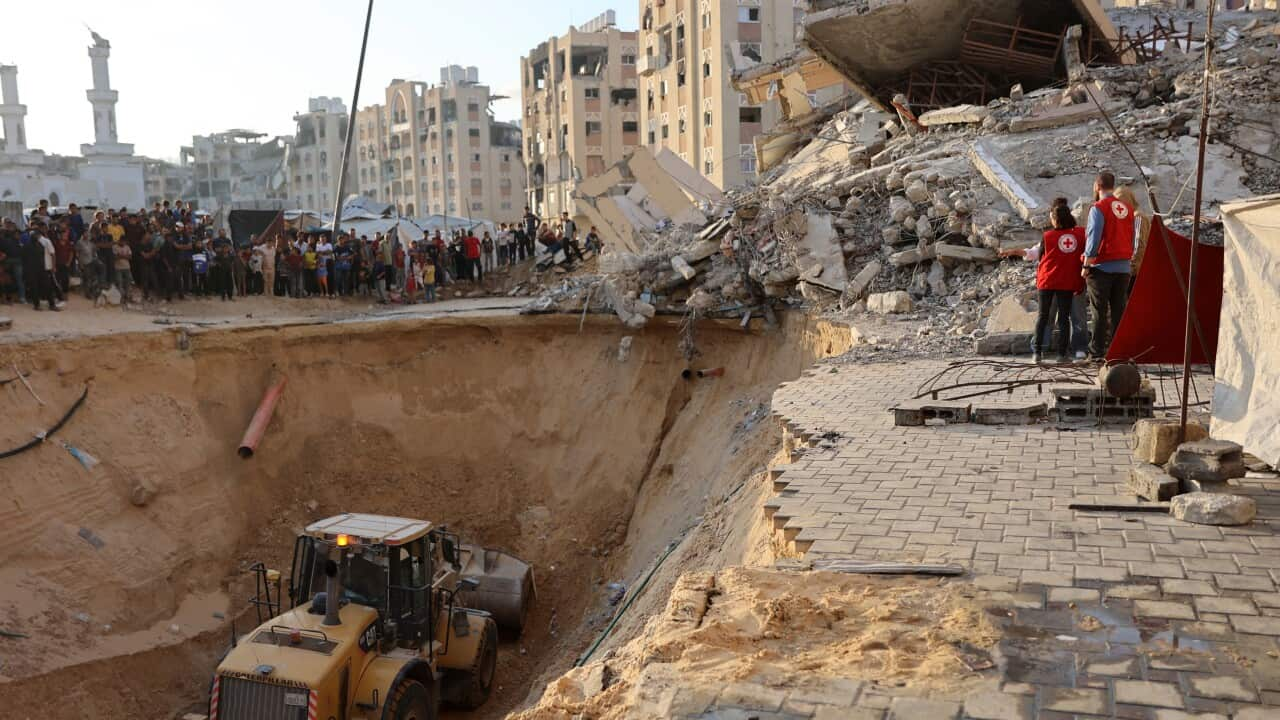Israeli Prime Minister Benjamin Netanyahu warned that the war in Gaza would not be over until Hamas was disarmed and the Palestinian territory demilitarised.
His declaration came as Hamas' armed wing, the Ezzedine al-Qassam Brigades, handed over the remains of two further hostages on Saturday night (local time) under a US-brokered ceasefire agreement.
The Israeli military said late Saturday that a Red Cross team had received the remains of two hostages and the coffins were on their way to its security forces in Gaza.
The issue of the dead hostages still in Gaza has become a sticking point in the implementation of the first phase of the ceasefire. Israel has linked the reopening of the key Rafah crossing to the territory to the recovery of the hostages' remains.
Netanyahu cautioned that completing the ceasefire's second phase was essential to ending the war.
He said late Saturday that "Phase B also involves the disarming of Hamas and the demilitarisation of the Gaza Strip."
"When that is successfully completed — hopefully in an easy way, but if not, in a hard way — then the war will end," he said during an appearance on right-wing Israeli Channel 14.
Hamas has so far resisted the proposal's conditions for disarmament and, since the pause in fighting, has moved to reassert its control over the Gaza Strip.
Hamas denies US reports of 'imminent ceasefire violation
Late on Saturday in Washington, the State Department said it had received "credible reports indicating an imminent ceasefire violation by Hamas against the people of Gaza."
The State Department said the planned attack against Palestinian civilians would be a "direct and grave violation of the ceasefire agreement".
"Should Hamas proceed with this attack, measures will be taken to protect the people of Gaza and preserve the integrity of the ceasefire," the department said in a statement, without providing further details.
Hamas denied on Sunday accusations of an "imminent attack" or a "violation" of the ceasefire.
It accused Israeli authorities of forming, arming and funding "criminal gangs" that carried out murders, kidnappings and aided looting.
The Palestinian militant group said police forces in Gaza were performing their duty by pursuing those gangs to hold them accountable.
"The movement calls on the US administration to stop repeating the occupation's misleading narrative," it added.
Israel keeps Rafah crossing closed
Under the ceasefire deal brokered by US President Donald Trump, Hamas has so far released all 20 living hostages, along with the remains of nine Israelis and one Nepali.
The most recent handover was on Friday night — the body identified by Israel as Eliyahu Margalit, who died aged 75 in Hamas' October 7 attack.
In exchange, Israel has released nearly 2,000 Palestinian detainees and prisoners and 135 other bodies of Palestinians since the truce came into effect on 10 October.
Hamas has said it needs time and technical assistance to recover the remaining bodies, which it says are buried under Gaza's rubble.
The two bodies to be returned on Saturday "were recovered earlier today", the al-Qassam Brigades said on Telegram.
Netanyahu on Saturday hinted that the reopening of the vital Rafah crossing to Egypt could depend on Hamas returning all the bodies of hostages still in Gaza.
The Palestinian mission in Cairo announced that the crossing could open as early as Monday, though only for Gazans living in Egypt who wished to return to the territory.
Shortly after, however, Netanyahu's office said he had "directed that the Rafah crossing remain closed until further notice".
"Its reopening will be considered based on how Hamas fulfils its part in returning the hostages and the bodies of the deceased, and in implementing the agreed-upon framework," it said, referring to the week-old ceasefire deal.
Hamas warned late Saturday that the closure of the Rafah crossing would cause "significant delays in the retrieval and transfer of remains".
While the Rafah crossing has yet to reopen just over a week since the brokering of the truce, hundreds of trucks are rolling in each day via Israeli checkpoints and aid is being distributed.
Around 560 metric tons of food had entered Gaza per day on average since the truce, but this was still well below the scale of need, according to the UN World Food Programme.
Eleven Palestinians killed in Israeli fire
Some violence has persisted despite the ceasefire.
Gaza's civil defence agency said on Saturday that it had recovered the bodies of nine Palestinians — two men, three women and four children — from the Shaaban family after Israeli troops fired two tank shells at a bus.
Two more victims were blown apart in the blast and their remains have yet to be recovered, it said.
At Gaza City's al-Ahli Hospital, the victims were laid out in white shrouds as their relatives mourned.
"My daughter, her children and her husband; my son, his children and his wife were killed. What did they do wrong?" demanded grandmother Umm Mohammed Shaaban.
The military said it had fired on a vehicle that approached the so-called "yellow line" — which has no physical markings — to which its forces withdrew under the terms of the ceasefire, and gave no estimate of casualties.
"The troops fired warning shots toward the suspicious vehicle, but the vehicle continued to approach the troops in a way that caused an imminent threat to them," the military said.
For the latest from SBS News, download our app and subscribe to our newsletter.

